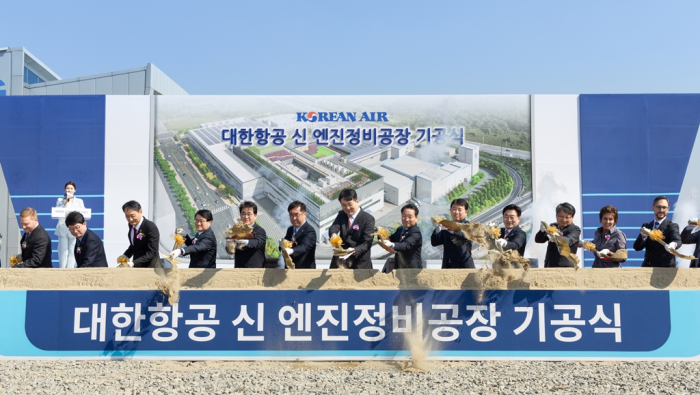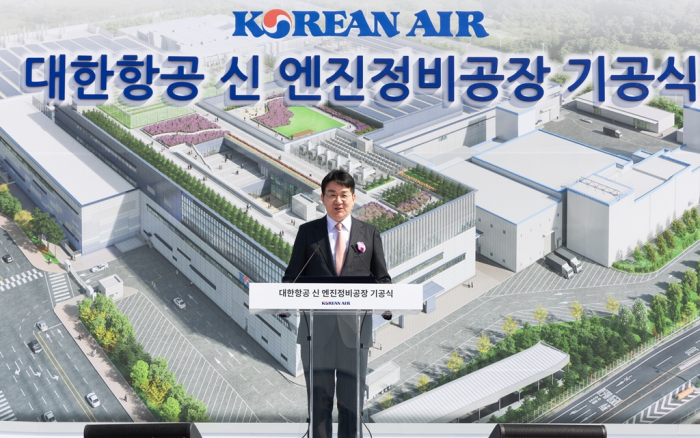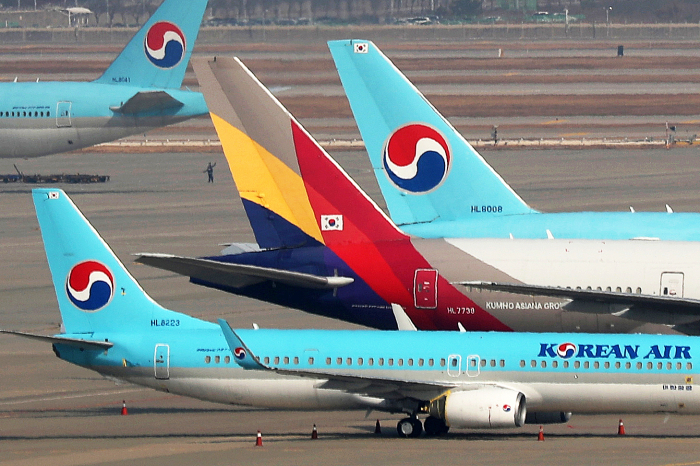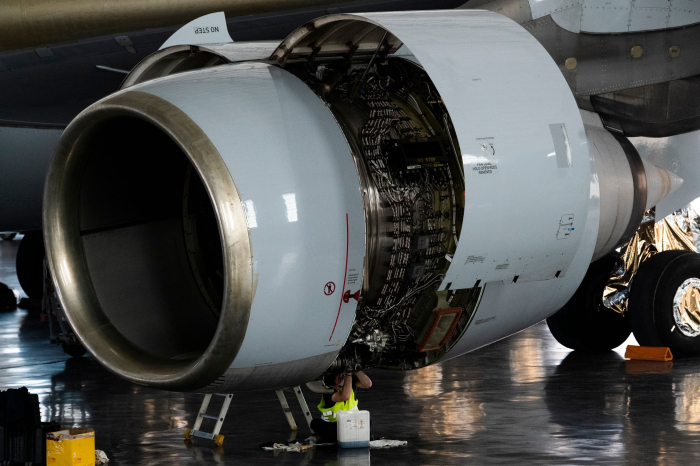Airlines
Korean Air breaks ground on Asia’s largest aircraft engine MRO cluster
Once up and running by 2027, the $439 million complex will streamline KAL’s engine maintenance and repair business
By Mar 14, 2024 (Gmt+09:00)
2
Min read
Most Read
LG Chem to sell water filter business to Glenwood PE for $692 million


Kyobo Life poised to buy Japan’s SBI Group-owned savings bank


KT&G eyes overseas M&A after rejecting activist fund's offer


StockX in merger talks with Naver’s online reseller Kream


Mirae Asset to be named Korea Post’s core real estate fund operator



Korean Air Lines Co., South Korea’s No. 1 full-service carrier, said on Thursday it has begun construction of a $439 million aircraft engine maintenance and repair cluster near Incheon International Airport, Korea’s main gateway.
Once completed, slated for 2027, the cluster will become the largest engine maintenance, known as MRO, complex in Asia, the company said.
Cho Won-tae, chairman of Hanjin Group, parent of the airline, and other dignitaries held a groundbreaking ceremony for the complex located on Yeongjongdo, an island in Incheon, 27 km west of Seoul.
“Once up and running, the complex will enhance Korea’s MRO competitiveness. Korean Air pledges to uphold the highest standards of safety and is committed to elevating Korea’s competitive edge in a highly specialized aviation sector,” the chairman, known in the Western world by his English name Walter Cho, said at the ceremony.

Korean Air, also known as KAL, plans to spend 578 billion won ($439 million) to build the complex on a 140,212-square-meter plot of land.
The cluster will be strategically located adjacent to Korean Air’s existing engine test cell (ETC) facility, which the airline has operated since 2016.
Korean Air currently manages its engine maintenance at its facility in Bucheon near Incheon, complemented by final performance testing at the ETC facility on Yeongjongdo Island.

NEW CLUSTER TO STREAMLINE MRO PROCESS
The new engine maintenance cluster will streamline this process with a strategic consolidation, enhancing operational efficiency by bringing all phases of engine maintenance to a single, centralized site, according to Korean Air.
With the new MOR cluster, the company also expects to enhance its annual aircraft engine maintenance capability from servicing 100 engines to 360 across nine engine types. Currently, the airline conducts overhauls on six engine models.
“The new cluster will bolster our aircraft overhaul capabilities and reduce Korea’s dependence on international maintenance services,” said a KAL official.

Korean Air is also exploring the possibility of servicing Asiana Airlines Inc.'s engines, including the Rolls-Royce Trent XWB used in the Airbus A350.
Korean Air is in the final stages of acquiring its crosstown rival Asiana to become one of the world’s top 10 airlines.
Write to Nan-Sae Bin at binthere@hankyung.com
In-Soo Nam edited this article.
More to Read
-
 AirlinesRace for Asiana's cargo unit heats up among local bidders
AirlinesRace for Asiana's cargo unit heats up among local biddersFeb 28, 2024 (Gmt+09:00)
1 Min read -
 AirlinesT’way, Air Premia to take off with Korean Air-Asiana merger
AirlinesT’way, Air Premia to take off with Korean Air-Asiana mergerFeb 14, 2024 (Gmt+09:00)
2 Min read -

-
 AirlinesAsiana’s cargo unit sale faces tough hurdles before KAL merger
AirlinesAsiana’s cargo unit sale faces tough hurdles before KAL mergerNov 03, 2023 (Gmt+09:00)
4 Min read -
 Mergers & AcquisitionsKorean Air, Asiana may merge MRO businesses after spin-off
Mergers & AcquisitionsKorean Air, Asiana may merge MRO businesses after spin-offNov 13, 2020 (Gmt+09:00)
3 Min read
Comment 0
LOG IN


